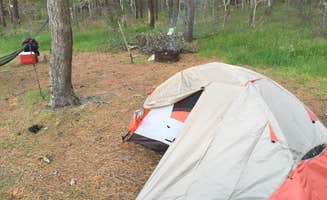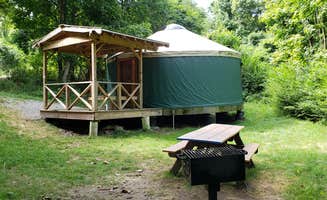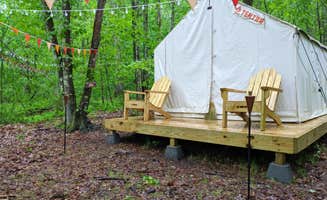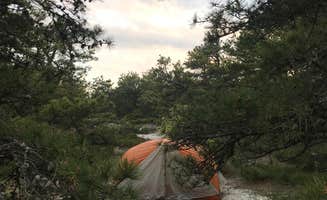Tent campsites near Warren, Rhode Island typically operate from May through September, with most primitive sites closing after Columbus Day weekend. The region features a mix of inland forested sites and coastal camping options, all within 30 miles of Warren. Water temperatures in nearby camping beaches average 65-70°F during summer months, and overnight temperatures can drop into the 50s even in July.
What to do
Island exploration: Washburn Island at Waquoit Bay Reserve offers secluded camping accessible only by boat. A camper noted, "Small island with 10 camp site (one group) all with views of the water very quiet at night. Fire pits at each site with wood on sale at the ranger hut."
Beachfront camping: Sandy Neck Beach allows overnight camping directly on the beach. A visitor reported, "This is one of the few places where you can sleep on the beach! The water is on the cold side but it's worth it. Beach camping is a very special thing."
Harbor island ferry excursions: Take advantage of island-hopping opportunities from Boston Harbor Islands State Park Campground. According to one camper, "During the day you can take small ferries to a variety of other islands to go swimming or explore. This is a great adventure for kids."
Beach bonfires: Many coastal campgrounds permit evening fires on designated beaches. A camper at Boston Harbor Islands mentioned, "We found all kinds of bunkers and a brick house. We ended up making a fire pit on the beach and a flat rock 'grill' to make our burgers."
What campers like
Secluded forest sites: The woodland camping areas provide quiet alternatives to busier coastal options. A visitor to Buck Hill Campground stated, "All the sites are in large clusters (each can accommodate 10+ tents). Many of the sites are also along Wakefield Pond (big enough lake for canoe/kayak/etc)."
Off-season availability: Smaller crowds make spring and fall excellent times for tent camping. One Washburn Island camper reported, "Campsites can be reserved 6 months in advance so it is tough to get one during the summer months but great camping in May, September, and October as well."
Yurt accommodations: For those seeking more shelter than a tent provides, Boston Harbor Islands State Park Campground offers alternative accommodations. A reviewer explained, "The yurts have bunk beds, a floor lamp, a table inside, a picnic table outside and a grill. Just getting to the island is a fun adventure."
Waterfront camping: Many sites provide direct access to water. A camper at Sandy Neck Beach Park Primitive Campsites shared, "Right on the water, relaxing and sunny most of the time! Campfires allowed at night, and pets are allowed. All around a great place to camp."
What you should know
Reservation timing: Camping spots at popular locations fill quickly. One camper at Sandy Neck Beach Park Primitive Campsites advised, "The sites are not reservable ahead of time. In order to secure a spot, you must show up at the park headquarters where sites are handed out on a first come first served basis."
Water access: Some sites require planning for water needs. At Sandy Neck, "A nice amenity is that the park staff will send someone to the sites to deliver 5 gallons of water for free as well as firewood for a small fee so you don't have to carry those resources."
Transportation logistics: Island camping requires additional planning. A Boston Harbor Islands visitor explained, "Getting to the island was a bit of a hassle. We live in Boston and took all of our gear on the T to the harbor by the aquarium. We then took the ferry to Georges Island. After that we waited and got on a much smaller island to Lovells."
Terrain challenges: Sandy trails can make access difficult. A Sandy Neck camper warned, "The hike in to the sites can be particularly difficult because it requires trekking through sand without any sun coverage and with all of your gear."
Tips for camping with families
Schedule buffer time: Allow extra time for ferry connections when camping on islands. A Boston Harbor camper suggested, "Figure out which departure makes the most sense for you. You may choose to leave from Long Wharf, near the Aquarium T stop on the Blue line, or from Hingham, with overnight parking available."
Pack strategically: Weight becomes critical when hiking to remote sites. A Boston Harbor Islands visitor recommended, "Pack as lightly as possible and plan to carry or wheel it to your site. If you have a folding wagon, you may appreciate having it to carry items on and off the ferry and to your site on the island."
Consider simple swimming spots: Some campgrounds offer gentler water access. A Buck Hill visitor noted, "There's a small somewhat sandy area that perhaps used to be a beach of sorts, though no lifeguards or anything. The water is clean and fine for swimming with a few areas that make for easy entry into the water."
Look for educational opportunities: Several campgrounds offer learning activities. A Boston Harbor Islands camper mentioned, "While you're out on the islands, take time to explore one of the others...earn a Junior Ranger badge from the National Park Service, fly a kite, or go for a swim or kayak."
Tips from RVers
Limited RV options: Most tent campsites near Warren have few RV amenities. At Arcadia Backpack Camping Area, facilities are primarily designed for tent camping, though some sites can accommodate small trailers.
Self-contained requirement: Some beach camping areas have specific requirements. A Sandy Neck visitor noted, "You need a sandy neck ORV pass and a self contained camper (toilet) to camp here, but it's very worth it."
Off-season advantages: Shoulder season camping offers more availability and privacy. A camper at Boston Harbor Islands observed that during mid-August, "We collected handfuls of blackberries as we explored Peddocks."
Weather preparation: Coastal sites experience significant wind. A Sandy Neck camper reported, "Took one more trip down for the end of the season, great weather but VERY windy."





